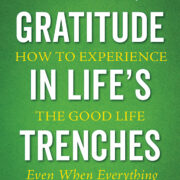Sometimes we over-complicate the spiritual life. In our obsession with the intellectual aspects of theology, we sometimes overlook the more basic aspects of the Christian faith.
Here are three basic foundations of the Christian life that we easily overlook:

- The love of God that has been poured out to us in Christ Jesus is so strong that no conceivable hardship can separate us from that love. (Romans 8: 35-39)
- Everything that happens to us is organized by Divine Love for our benefit, even if we can’t understand how. (Romans 8:28; Matthew 10:29-31)
- In response to this love, we are commanded to replace anxious thoughts with a moment-by-moment awareness of all that is lovely, noble and good. (Philippians 4:6-8; 2 Thessalonians 5:16-18; Luke 12:29)
These three truths are found throughout Scripture, and it is a worthwhile activity to go through all of the Psalms, the Sermon on the Mount and the epistles, to make a note of every passage where one of these truths can be found. Then ask yourself, do I really and truly believe that no hardship can separate me from the love of God and that everything which happens–however difficult it is for me–has been arranged for my benefit?
If each of us could get to the point of really believing what we already know from Scripture to be true, then we would never have an anxious thought again, and would never have an occasion to grumble, no matter what was happening around us. Not only that, but we would be constantly rejoicing. Even when people practice evil upon us, we could learn to say, like Joseph in Genesis 50:20, “you meant evil against me; but God meant it for good.”
Do a little thought experiment. Imagine for a moment that every single person in the world had their consciousness continually focused on loving you. Imagine that every single person was working all the time to arrange things for your good. If that was the case, would you have cause to ever worry or complain? Would you experience anxiety about needing to grasp good things for yourself? Obviously not. And yet the reality is that if you are in Christ are in a better position than if every single person in the world had their attention continually focused on arranging things for your advantage, for God Himself, the maker and sustainer of the entire universe, has His infinite attention continually focused on arranging every circumstance to your advantage (not what you want, but what will really benefit you).
The desert father, Dorotheos of Gaza, reflected on this wonderful truth in the following passage, which is simply an extended reflection on the three spiritual axioms mentioned earlier:
“And he must believe that nothing happens apart from God’s providence. In God’s providence everything is absolutely right and whatever happens is for the assistance of the soul. For whatever God does with us, he does out of his love and consideration for us because it is adapted to our needs. And we ought, as the Apostle says, in all things to give thanks for his goodness to us, and never to get het up or become weak-willed about what happens to us, but to accept calmly with lowliness of mind and hope in God whatever comes upon us, firmly convinced, as I said, that whatever God does to us, he does always out of goodness because he loves us, and what he does is always right. Nothing else could be right for us but the way in which he mercifully deals with us.
If a man has a friend and he is absolutely certain that his friend loves him, and if that friend does something to cause him suffering and be troublesome to him, he will be convinced that his friend acts out of love and he will never believe that his friend does it to harm him. How much more ought we to be convinced about God who created us, who drew us out of nothingness to existence and life, and who became a man for our sakes and died for us, and who does everything out of love for us?
It is conceivable that a friend may do something because he loves me and is concerned about me which, in spite of his good intentions, does me harm; this is likely to happen because he does not have complete knowledge and understanding of what my needs and destiny are. But we cannot say the same about God, for he is the fountain of wisdom and he knows everything that is to my advantage, and with this in view he arrange4s everything that concerns me without counting the cost. Again, about the friend who loves me and is concerned about me and conscientiously looks after my welfare: it can certainly happen in certain circumstances that he thinks I need help and yet he is powerless to help me. Even this we cannot say about God. For to him all things are possible; with God nothing is impossible. God, we know, loves and takes care of what he has fashioned. He is the fountain of wisdom and he knows what to do to promote our welfare and nothing is beyond his power. Hence we must be convinced that all he does, he does for our benefit and we ought to receive it with gratitude, as we said before, as coming from a beneficent and loving Master—and this even if some things are distressing, for all things happen by God’s just judgment … [From Dorotheos Of Gaza: Discourses and Sayings]
To know that everything which happens to us is arranged for the assistance of our soul, and to know that even distressing circumstances do not just happen by accident but occur through God’s just judgment, creates a context in which to situate all our experiences.
How does this apply in practice when we are suffering, when we are in a state of despair, or even just lonely, confused and vulnerable? For one thing, it means we can learn to “reframe” our difficulties by continually reminding ourselves of the three points above that I shared at the beginning off this post. We can remind ourselves that since everything that happens is organized by Divine Love for our benefit, there must be a positive purpose to even the most confusing and difficult things we face. By practicing cognitive reframing, we can begin to see our trials as opportunities instead of obstacles (James 1:2-3).
The difference between a life of gratefulness vs. a life of grumbling lies in the power of these frames. The difference between a life of joy and a life of miserable self-pity lies in the power of these frames. The difference between a life of love vs. a life of selfishness lies in the power of these frames. The difference between a life of anxiety vs. a life of peace lies in the power of these frames.
Choose to frame our experiences in terms that emphasize everything there is to be grateful for, as Paul did when he wrote his letter to the Philippians from prison, isn’t just a good thing to do so we can be happy or learn to cope with difficulty; rather, doing this is actually aligning our minds with the truth about reality. Provided that we stay connected to Christ, the Christian really does live in a universe in which everything is ordered for his ultimate good and in which every event (even unpleasant events) are grounds for deep gratitude and profound joy. Thus, for the Christian gratefulness is so much more than merely good medicine, it’s actually the most rational thing to do.
By contrast, every time I grumble and every time I allow anxiety about the future to create stress, I am actually believing a lie since I am essentially saying (or maybe just feeling) that something other than God’s design for my life would have been better. To grumble is to commit the ultimate folly of saying I know better than Infinite Wisdom what it is I need, what it is that will benefit me, and what the pathway to my own flourishing should look like.
Further Reading



